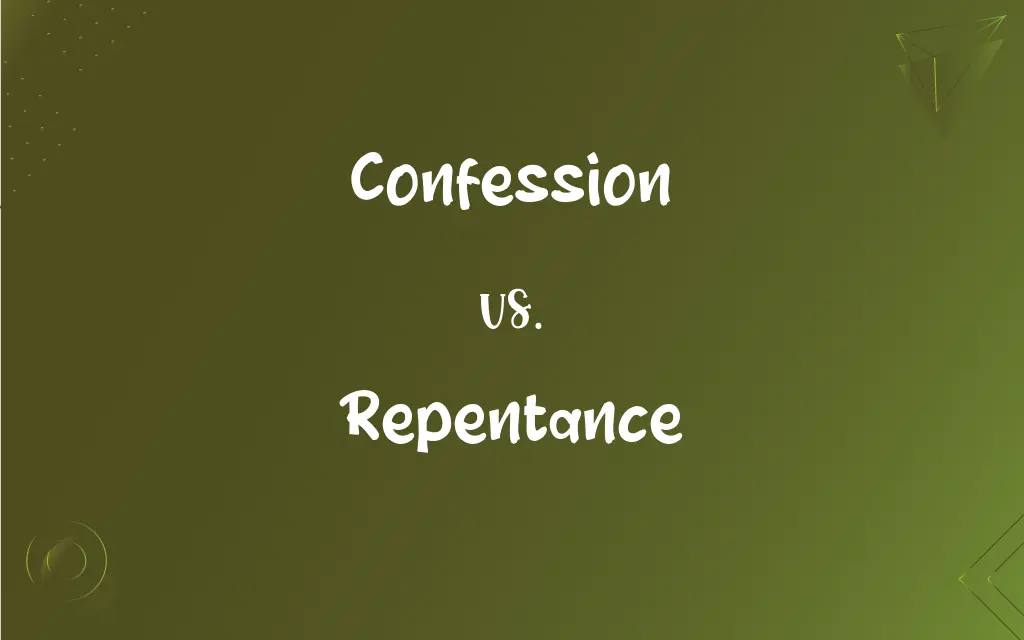Confession vs. Repentance: What's the Difference?
Edited by Harlon Moss || By Janet White || Published on December 10, 2023
Confession is the act of admitting wrongdoing or guilt, whereas repentance involves feeling remorse for one's actions and committing to change.

Key Differences
Confession refers to the act of acknowledging one's faults or sins, typically to another person or a higher power. It involves openly admitting mistakes or wrongdoings. In many religious contexts, confession is seen as a step towards redemption and is often a ritualistic or formal process. Repentance, on the other hand, goes beyond mere admission of guilt. It encompasses a deep sense of remorse or contrition for past actions and is often accompanied by a sincere commitment to change and improvement.
In the context of confession, one might verbally acknowledge a mistake or sin. In repentance, this acknowledgment is coupled with emotional regret and a proactive plan to avoid such actions in the future. Confession can be seen as the first step towards repentance.
Confession often involves an element of seeking forgiveness, either from others or from a divine entity. Repentance, while it may also seek forgiveness, is more about the internal transformation and the resolve to do better.
Both confession and repentance are crucial in various religious and moral frameworks. Confession opens the door to forgiveness and reconciliation, while repentance ensures the sustainability of personal growth and ethical behavior.
Comparison Chart
Definition
Admission of guilt or wrongdoing
Remorse and commitment to change
ADVERTISEMENT
Focus
Acknowledging the action
Changing behavior and attitude
Emotional Aspect
May or may not involve remorse
Involves deep remorse
Action-Oriented
Primarily verbal or mental admission
Includes a plan for behavioral change
End Goal
Seeking forgiveness or acceptance
Personal transformation and improvement
Confession and Repentance Definitions
Confession
Acknowledgment of one's mistakes or sins.
In his confession, he admitted to taking the money.
ADVERTISEMENT
Repentance
Feeling remorse for past actions.
His repentance was evident in his tearful apology.
Confession
Formal declaration of one's sins to a priest.
She went to the church for her weekly confession.
Repentance
A commitment to change one's behavior.
After his mistake, he showed true repentance by working to fix the problem.
Confession
Expression of personal faults or beliefs.
His confession of love was unexpected but heartfelt.
Repentance
A religious act of seeking forgiveness for sins.
During Yom Kippur, she practiced repentance through prayer and fasting.
Confession
Disclosure of something private or secret.
His confession about his past surprised everyone.
Repentance
Turning away from sin or wrongdoing.
His repentance led him to abandon his previous lifestyle.
Confession
An admission of guilt in a legal context.
The suspect's confession was a key piece of evidence in the trial.
Repentance
Reflecting on and regretting past wrongs.
In her memoirs, she wrote about her repentance for past decisions.
Confession
The act or process of confessing, as in telling one's life story as a series of failings or tribulations.
Repentance
The act or process of repenting.
Confession
Something confessed, especially a disclosure of one's sins to a priest for absolution.
Repentance
Remorse or contrition for past conduct or sin.
Repentance
The condition of being penitent.
Repentance
A feeling of regret or remorse for doing wrong or sinning.
Repentance
The act of repenting, or the state of being penitent; sorrow for what one has done or omitted to do; especially, contrition for sin.
Godly sorrow worketh repentance to salvation.
Repentance is a change of mind, or a conversion from sin to God.
Repentance is the relinquishment of any practice from the conviction that it has offended God. Sorrow, fear, and anxiety are properly not parts, but adjuncts, of repentance; yet they are too closely connected with it to be easily separated.
Repentance
Remorse for your past conduct
FAQs
What is confession?
Confession is admitting wrongdoing or guilt, often to another person or a divine figure.
Is confession always religious?
No, confession can occur in both religious and secular contexts.
Can confession lead to repentance?
Yes, confession can be a first step towards repentance and personal growth.
Can repentance occur without confession?
Yes, one can repent without formally confessing, though confession often accompanies repentance.
Is confession necessary for forgiveness?
In many beliefs, confession is an important step towards seeking forgiveness.
What are the benefits of confession?
Benefits include emotional relief, forgiveness, and reconciliation.
How does repentance impact personal growth?
Repentance can lead to significant personal growth and ethical development.
How do you show repentance?
Repentance can be shown through actions, change in behavior, and making amends.
What does repentance involve?
Repentance involves feeling remorse and making a committed effort to change.
What is the purpose of repentance?
The purpose of repentance is to acknowledge wrongs and commit to better behavior.
What role does emotion play in confession?
Emotion in confession can range from guilt to relief.
Is repentance always related to guilt?
Repentance typically involves a sense of guilt or regret.
Is repentance a one-time act?
Repentance is often an ongoing process rather than a one-time act.
What differentiates repentance from mere regret?
Repentance involves active commitment to change, beyond just feeling regret.
Can confession be private?
Yes, confession can be a private act, not necessarily involving another person.
Can confession be therapeutic?
Yes, confession can be therapeutic, offering emotional release.
Does repentance guarantee forgiveness?
Repentance doesn't always guarantee forgiveness, but it is a step towards it.
Can confession be forced?
Genuine confession should be voluntary, not forced.
Is repentance a part of all religions?
Concepts of repentance appear in many, but not all, religions.
How does one practice repentance?
Practicing repentance involves reflection, apology, and concrete steps to change.
About Author
Written by
Janet WhiteJanet White has been an esteemed writer and blogger for Difference Wiki. Holding a Master's degree in Science and Medical Journalism from the prestigious Boston University, she has consistently demonstrated her expertise and passion for her field. When she's not immersed in her work, Janet relishes her time exercising, delving into a good book, and cherishing moments with friends and family.
Edited by
Harlon MossHarlon is a seasoned quality moderator and accomplished content writer for Difference Wiki. An alumnus of the prestigious University of California, he earned his degree in Computer Science. Leveraging his academic background, Harlon brings a meticulous and informed perspective to his work, ensuring content accuracy and excellence.






































































